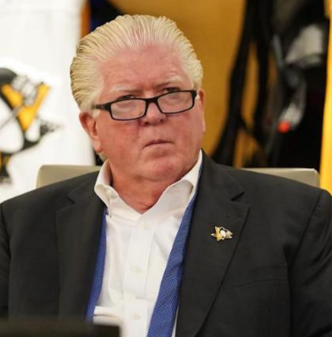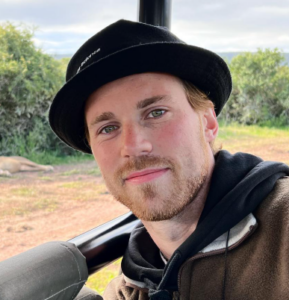Brian Burke is known not only for his professional achievements but also for his outspoken and charismatic personality.
He has been a vocal advocate for various social causes, including LGBTQ+ rights, and has used his platform to promote inclusivity in sports.
Burke’s legacy extends beyond his on-ice accomplishments, as he continues to inspire and lead both within and outside the hockey community.
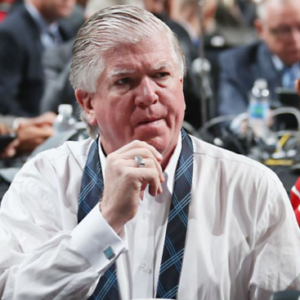
Also Read: Ranking the Top 5 NHL Father-Son Duos Drafted in the Top 15, Featuring Darryl and Ryan Sittler
Table of Contents
Brian Burke: Bio
Brian P. Burke was born on June 30, 1955, in Providence, Rhode Island. He grew up with a passion for sports, particularly ice hockey, which would shape his career path.1
Burke attended Providence College, where he played for the college hockey team, the Friars. His leadership skills and understanding of the game were evident from a young age, and he graduated with a degree in history.
Later, he pursued a law degree from Harvard Law School, further equipping himself with skills that would serve him well in his future executive roles in hockey.
So incredibly proud to march with the @PWHLPA at #TorontoPride today. 🌈 pic.twitter.com/b9xA8QEcqG
— Brian Burke (@Burkie2020) June 30, 2024
Early Life and Education
Burke’s professional journey in hockey began shortly after completing his law degree. He started his career as an agent, representing players in contract negotiations and legal matters.
This experience gave him a unique perspective on the business side of the sport, and he quickly gained a reputation for his sharp negotiation skills and deep understanding of the game.
In the early 1990s, Burke transitioned from player representation to the administrative side of hockey. He joined the NHL league office, where he served as the director of hockey operations.
In this role, Burke was responsible for overseeing the implementation of league policies and ensuring that the rules of the game were upheld. His work in the league office laid the foundation for his future roles as a team executive.
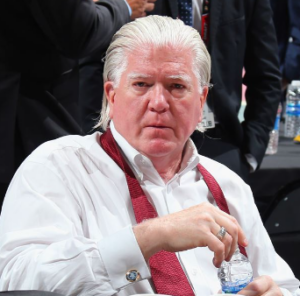
Brian Burke: Career
Hartford Whalers
Burke’s first major role as a general manager came with the Hartford Whalers in 1992.2
Although his tenure with the Whalers was relatively short, it provided him with valuable experience in managing a professional hockey team.
He was responsible for player acquisitions, trades, and overall team strategy, setting the stage for his later successes.
Vancouver Canucks
In 1998, Burke took on the role of general manager for the Vancouver Canucks. During his time with the Canucks, Burke made several significant moves that would shape the team’s future.
One of his most notable achievements was drafting the Sedin twins, Daniel and Henrik, in 1999. The Sedins would go on to become franchise players and key figures in the Canucks’ history.
Burke’s bold decisions and aggressive style made him a prominent figure in the NHL.
Anaheim Ducks and Stanley Cup Victory
- Burke’s most successful tenure as a general manager came with the Anaheim Ducks.
- He joined the Ducks in 2005 and quickly made a series of strategic moves that would lead the team to its first Stanley Cup victory in 2007.
- Burke’s ability to build a balanced team, focusing on both skill and physicality, paid off as the Ducks defeated the Ottawa Senators in the finals.
- This achievement solidified Burke’s reputation as one of the top executives in the sport.
- During his time with the Ducks, Burke made several key acquisitions that were instrumental in the team’s success.
- He brought in defenseman Chris Pronger, whose leadership and defensive prowess were crucial during the playoffs.
- Burke also signed Teemu Selanne, a veteran forward who played a pivotal role in the team’s offensive strategy.
- These moves demonstrated Burke’s keen eye for talent and his ability to build a championship-winning team.
Toronto Maple Leafs
Following his success with the Ducks, Burke was hired as the general manager and president of hockey operations for the Toronto Maple Leafs in 2008.
The Maple Leafs, one of the NHL’s most storied franchises, were in need of a rebuild, and Burke was seen as the right person to lead this effort.
His tenure in Toronto was marked by several bold moves, including high-profile trades and free-agent signings.

Phil Kessel Trade
One of Burke’s most controversial moves with the Maple Leafs was the trade for Phil Kessel in 2009. Burke acquired Kessel from the Boston Bruins in exchange for two first-round draft picks and a second-round pick.
While Kessel was a prolific scorer for the Leafs, the trade was heavily scrutinized as the Bruins used the picks to select future stars Tyler Seguin and Dougie Hamilton. Despite the mixed reviews, Burke stood by his decision, highlighting his willingness to take risks.
Calgary Flames
In 2013, Burke joined the Calgary Flames as president of hockey operations. His role with the Flames was more strategic, focusing on long-term planning and organizational development.
Burke’s experience and leadership helped guide the Flames through a rebuilding phase, laying the groundwork for future success. His time in Calgary was marked by a focus on developing young talent and building a competitive team.
Pittsburgh Penguins
- Burke’s next major role came in 2021 when he was appointed as the president of hockey operations for the Pittsburgh Penguins.
- Working alongside general manager Ron Hextall, Burke was tasked with maintaining the Penguins’ status as a perennial contender.
- His tenure in Pittsburgh involved managing the team’s salary cap, making key player acquisitions, and ensuring the team remained competitive in a rapidly changing NHL landscape.
- In addition to his roles with NHL teams, Burke has also made significant contributions to international hockey. He served as the general manager for the United States national team during the 2010 Winter Olympics in Vancouver.
- Under his leadership, the team won the silver medal, showcasing Burke’s ability to manage and motivate players on the international stage.
- His work with Team USA highlighted his commitment to growing the sport and developing talent at all levels.
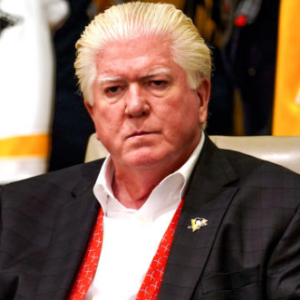
Brian Burke: Professional Women’s Hockey League Players Association
In 2024, Burke took on a new challenge as the Executive Director of the Professional Women’s Hockey League Players Association (PWHLPA).
In this role, he advocates for the rights and interests of female hockey players, working to improve conditions, pay, and opportunities for women in the sport.
Burke’s dedication to hockey extends beyond the men’s game, as he seeks to promote equality and growth in women’s hockey as well.
Contributions to Rugby Canada
Beyond hockey, Burke has also been involved in other sports. He is a member of Rugby Canada’s board of directors, contributing his leadership and strategic thinking to the development of rugby in Canada.
His involvement in multiple sports organizations demonstrates his versatility and commitment to sports development at all levels.
Burke’s contributions to hockey have been widely recognized. In 2019, he was inducted into the Rhode Island Hockey Hall of Fame, an honor that celebrated his achievements and impact on the sport.
This induction was a testament to Burke’s influence and legacy in the world of hockey.
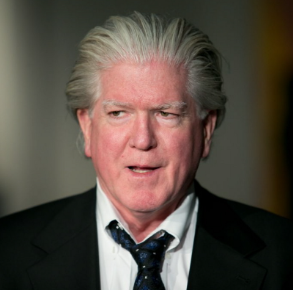
Also Read: Chris Kreider’s Sneaky Move: NHL Fans React to Mouth Guard Toss
Brian Burke: Family
Brian Burke, a well-known figure in the world of ice hockey, has a rich personal history that interweaves his Irish heritage, dual citizenship, family dynamics, and his strong advocacy for gay rights.
Irish Heritage
Burke’s roots trace back to Ireland, with both of his parents hailing from Irish descent. Specifically, his lineage connects to County Roscommon and County Mayo.
This connection to Ireland has played a significant role in shaping his identity and values throughout his life.
Family and Dual Citizenship
Brian Burke is a dual citizen of the United States and Canada, a status that reflects his deep ties to both countries. This dual citizenship has likely influenced his professional life in the NHL, where he has worked extensively in both American and Canadian cities.
He has two daughters with his ex-wife, Jennifer Mather Burke, who is an anchor at CTV News Channel. One of his daughters, Katie, was married to baseball executive Jared Porter until 2014.
The dynamics of his family life have been complex, with relationships that span different sports and professional environments.
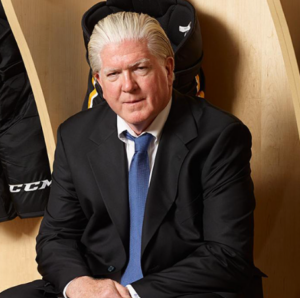
Brian Burke: Controversy
Brian Burke’s personal life was profoundly impacted by the tragic death of his son, Brendan Burke, in 2010.
Brendan, who was openly gay, died at the age of 21 from injuries sustained in a car accident in Indiana. This loss was a turning point for Burke, who became a strong advocate for gay rights in honor of his son.
In February 2011, Burke attended a tribute for Brendan, reflecting his commitment to preserving his son’s legacy.
This dedication extended to his participation in the 2009, 2010, and 2011 Toronto Gay Pride parades. These actions underscored his support for the LGBTQ+ community and his determination to fight against homophobia in sports.
The You Can Play Project
In 2012, Brian Burke and his son Patrick launched the You Can Play project, an initiative aimed at ending homophobia in sports.
This project was established in honor of Brendan Burke and has been a significant part of Brian Burke’s advocacy work. The You Can Play project focuses on ensuring safety and inclusion for all athletes, regardless of sexual orientation.
Defamation Lawsuit
In April 2013, Brian Burke filed a defamation lawsuit against 18 individuals who had anonymously posted defamatory statements about him on various websites.
These individuals had falsely claimed that Burke was fired from his position with the Toronto Maple Leafs due to an alleged affair with a female sportscaster and the fathering of her child.
Burke’s lawsuit aimed to uncover the identities of these anonymous posters and seek retractions for the false claims.
In a minor victory, the Supreme Court of British Columbia ruled that the anonymous defendants could be served notice of the proceedings through private messaging on the message boards they had used.
By April 2014, Burke and his legal team had successfully identified several individuals and forced them to retract their statements.
